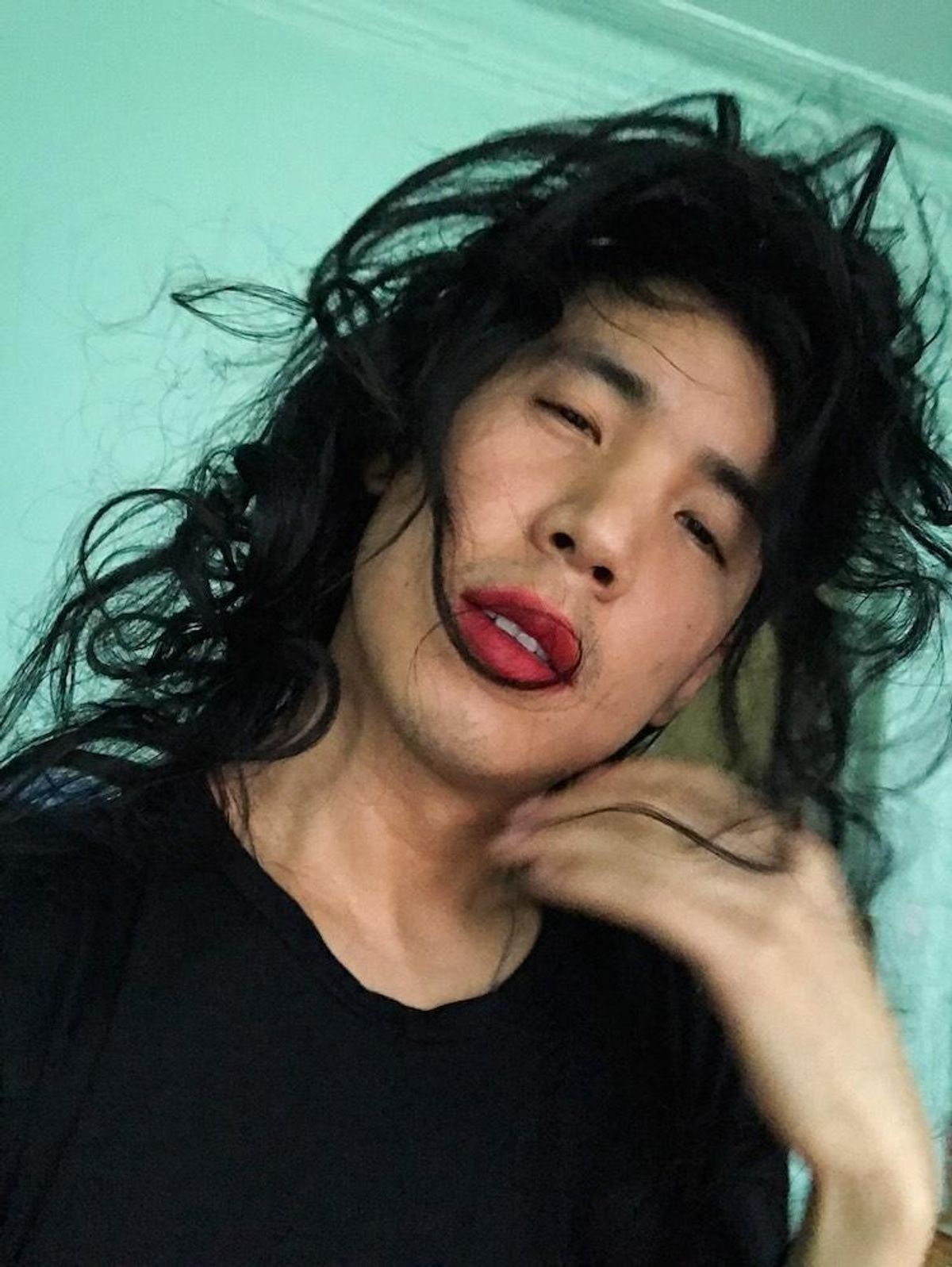In summer 2016, in the wake of Pulse nightclub shooting and police-shooting deaths of Philando Castile and Alton Sterling, artist Jon Wang found solace in silkworms.
Wang had been thinking about silk for a while, both as a material and a cultural force--desire for silk shaped early trade routes and, subsequently, humanity. Wang decided to try raising the little critters, right there, in a concrete editing studio at Bard, where Wang is finishing his MFA. It was a purgative experience; an alleviating ritual. "Raising them and filming them each day became a really cathartic daily practice that helped me process all of the violence." Wang said. "Their metamorphic process became really significant to me."
And it's to silkworms that Wang returns with "Garden of Perfect Exposure," the artist's contribution to SculptureCenter's latest group show, In Practice: Another Echo, curated by Allie Tepper. Wang's piece, named in honor of "the Garden of Perfect Brightness," the lush Imperial gardens destroyed by Anglo and French forces during the Second Opium War, in 1860, is a silkworm habitat writ--and voiced--large: the viewer steps through weather stripping into a warm chamber; the worms' preferred climate. In the center of the room stands a messy tangle of bath-caddies fastened together by magnets and with pathways made from roofing material, Plexiglas, and other everyday materials, including laminated pieces of Wang's own hair, i.e.: the "reimagining biological material as building material." This is the core habitat, a video of which is splashed across the walls, as the perspective constantly shifts from worm to viewer--all narrated by Wang's voice. Sometimes narrating the worm's journey. Sometimes whispering to them softly.
Taken together, the piece is meant to impart a sense of Wang's own ongoing disorientation. "So much of my anxiety living in this country right now has to do with questions around individual agency," Wang explains. "By presenting all the various vantage points in the same room, from the viewer's position to the camcorders to the projections to the video feedback loops to silkworm voiceovers, I was attempting to capture my overall sense of obsession and disorientation." The piece also presents an excellent snapshot of into Wang's creative philosophy. The artist strives constantly for WangShui, which Wang describes as a "state of constant change."

Jon Wang, Gardens of Perfect Exposure, 2018, detail, SculptureCenter, New York 2018. Chromed bath fixtures, silkworms, roof repair fabric, luminated hair, glass gobs, TV, selfie ring lights, plexiglass, earrings, HD camcorders, rehydrated mulberry leaves, silk, magnets. Dimensions variable. Courtesy the artist. Photo: Kyle Knodell
"Its edges are never clear and it is about being in a constant state of transition," Wang says. "I've never been capable of producing discreet forms. I always have to add extra objectives and appendages." Hence the labyrinthine silkworm habitat. "It's important to me to never fully understand where a piece begins or ends. That's why I am drawn to creating spaces: they are meant to change."
Wang traces this interest in space manipulation to a childhood spent between the U.S. and Asia, often wherever his Chinese Christian missionary parents were stationed. It was an unmooring experience, and interior work settled Wang's nerves. "I spent a lot of my childhood rearranging furniture," Wang recalls. "Creating spaces that I felt comfortable in was very important to my well-being." All that interior work served Wang well in 2013, when Wang and business partner Sean Roland launched ZEZE Hotel, a hospitality and art space in Hudson, NY.
More than an airBNB, the renovated home doubles as a welcoming and ever-changing installation for queer creatives--all part of Wang's attempts at dissolving the lines between art and hospitality. And, again, this was born from Wang's personal needs: "I felt really alienated upstate being one of the only queer people of color I knew." Wang wanted a space where queer people could feel comfortable, so Wang created it. "It's important to develop spaces where fixed social dynamics can be undermined and art can be experienced in new ways."

Painting by Maryam Hoseini for S H U I and PIN-UP.
Next, Wang and Roland are applying that sensibility to SHUI, a 6,000-sq. ft. queer spa in Chinatown. While spas vis a vis gay culture have been precisely that--gay--Wang hopes to create a wellness space that eschews binaries, aiming for a truly holistic, inclusive experience. "The right to wellness is often class-based but also gender-based," Wang says. "Actual queer, non-binary and trans people, like myself, don't have wellness spaces where we feel safe and comfortable, so we are trying to design for that."
SHUI will feature all the amenities one expects from a downtown Manhattan spa--steam rooms with herbal aromas and saltwater pools--but visitors, clad in unisex bathing suits developed with rotating artists, will be given more power over who sees and doesn't see their bodies thanks to walls that go from transparent to opaque at the push of a button.
Removing the spa setting from its traditional gendered neuroses and concerns, Wang's concentrating queerness, creating a self-contained but potent antidote to toxic heteronormativity that's grown thicker in recent months: in development since 2013, SHUI at one point looked like the realization of a progressive promise, the end result of a more inclusive society; now it seems like resistance. "It was always urgent to me," Wang says, "but that feeling has intensified now." And though this may not seem that powerful--an artist's queer spa in downtown Manhattan--just remember the silkworm, a creature whose gossamer yet muscular release changed the world.






















































































